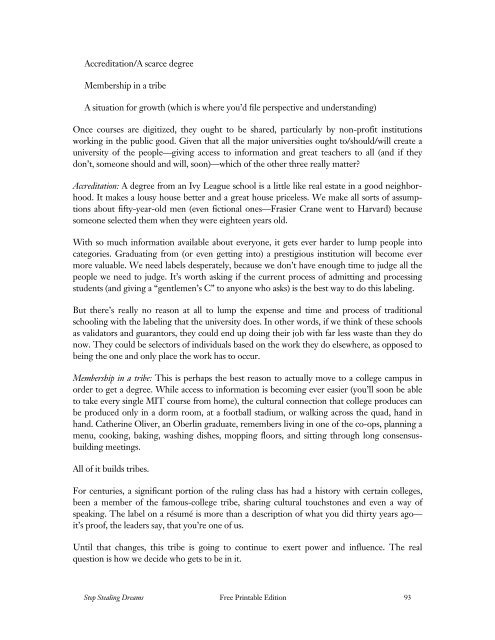1DO0vxU
1DO0vxU
1DO0vxU
Create successful ePaper yourself
Turn your PDF publications into a flip-book with our unique Google optimized e-Paper software.
Accreditation/A scarce degree<br />
Membership in a tribe<br />
A situation for growth (which is where you’d file perspective and understanding)<br />
Once courses are digitized, they ought to be shared, particularly by non-profit institutions<br />
working in the public good. Given that all the major universities ought to/should/will create a<br />
university of the people—giving access to information and great teachers to all (and if they<br />
don’t, someone should and will, soon)—which of the other three really matter?<br />
Accreditation: A degree from an Ivy League school is a little like real estate in a good neighborhood.<br />
It makes a lousy house better and a great house priceless. We make all sorts of assumptions<br />
about fifty-year-old men (even fictional ones—Frasier Crane went to Harvard) because<br />
someone selected them when they were eighteen years old.<br />
With so much information available about everyone, it gets ever harder to lump people into<br />
categories. Graduating from (or even getting into) a prestigious institution will become ever<br />
more valuable. We need labels desperately, because we don’t have enough time to judge all the<br />
people we need to judge. It’s worth asking if the current process of admitting and processing<br />
students (and giving a “gentlemen’s C” to anyone who asks) is the best way to do this labeling.<br />
But there’s really no reason at all to lump the expense and time and process of traditional<br />
schooling with the labeling that the university does. In other words, if we think of these schools<br />
as validators and guarantors, they could end up doing their job with far less waste than they do<br />
now. They could be selectors of individuals based on the work they do elsewhere, as opposed to<br />
being the one and only place the work has to occur.<br />
Membership in a tribe: This is perhaps the best reason to actually move to a college campus in<br />
order to get a degree. While access to information is becoming ever easier (you’ll soon be able<br />
to take every single MIT course from home), the cultural connection that college produces can<br />
be produced only in a dorm room, at a football stadium, or walking across the quad, hand in<br />
hand. Catherine Oliver, an Oberlin graduate, remembers living in one of the co-ops, planning a<br />
menu, cooking, baking, washing dishes, mopping floors, and sitting through long consensusbuilding<br />
meetings.<br />
All of it builds tribes.<br />
For centuries, a significant portion of the ruling class has had a history with certain colleges,<br />
been a member of the famous-college tribe, sharing cultural touchstones and even a way of<br />
speaking. The label on a résumé is more than a description of what you did thirty years ago—<br />
it’s proof, the leaders say, that you’re one of us.<br />
Until that changes, this tribe is going to continue to exert power and influence. The real<br />
question is how we decide who gets to be in it.<br />
Stop Stealing Dreams Free Printable Edition 93


